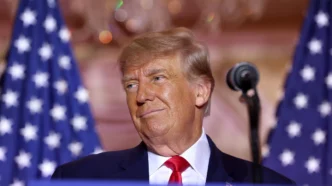A sweeping wave of U.S. import tariffs announced by President Donald Trump has thrown Europe’s tech industry into a state of uncertainty. On Wednesday, Trump confirmed a universal 10% tariff on all imports. With goods from the European Union facing a 20% levy, leaving founders, investors, and policy watchers scrambling to assess the fallout.
While some voices see an opening for European tech sovereignty, many fear the tariffs could destabilize supply chains, curb VC activity. And force tough decisions on where startups build, scale, and manufacture.
“It’s an economic gut punch,” says Vitor Monteiro, CTO and cofounder of Portuguese AI studio Unflow. “Costs will spike on everything from cloud compute to hardware imports, and it could choke off the funding channels that help keep European startups growing.”
The announcement confirmed what many had long feared since Trump’s return to office in January. Several founders told Sifted they had begun contingency planning months ago in anticipation of restrictive trade policies.
“Startups with physical products or U.S.-bound exports are going to feel the sting first,” says Claire Trachet, CEO of fundraising advisory Trachet. “It’s no longer just about where your customers are—it’s about where your supply chain, talent, and funding come from.”
One founder from a European chip startup, speaking anonymously, called the news “very concerning.” Their concern stems not only from direct hardware tariffs but also from spillover effects hitting suppliers like TSMC. Whose components are integral to many AI and semiconductor startups.
Further tariffs targeting semiconductors may be on the horizon, they warned.
European startups reliant on U.S. infrastructure for AI development could also find themselves squeezed. Jonatan Luther-Bergquist, partner at Berlin-based Inflection VC, says over-reliance on American cloud platforms and dollar-denominated contracts just got riskier.
“If your compute stack is built on U.S. hardware or hyperscaler GPUs, your budget and your roadmap just became a lot less predictable,” he notes.
For hardware-focused startups like SOVN, based in the Netherlands, the tariffs hit close to home. Cofounder Selina Tirtajana says her team had projected most sales to come from the U.S. this year.
“We’re facing a dilemma,” she says. “Do we pass the added cost onto consumers, which undercuts our mission of accessibility, or do we absorb the hit and risk investor pushback over margins?”
Even software companies, typically shielded from trade issues, are beginning to feel the pressure.
“Tariffs used to be someone else’s problem,” says Dom Hallas, executive director of the Startup Coalition. “But when the scale is this big, it starts affecting global liquidity, capital flows, and how long runway startups actually have.”
The broader investor ecosystem isn’t immune. Tariffs may cool the influx of U.S. venture dollars into European startups, especially as American investors look inward. According to Dealroom, U.S. VCs outpaced their European peers in startup investment across Europe in 2024—a trend now under threat.
“There’s a real possibility that funding pipelines will narrow,” warns Alex Neves, CEO of Clean Food Group. “If U.S. capital dries up, European startups could be left scrambling to fill the gap.”
Europe-based VCs are also expected to tread more carefully. Barney Hussey-Yeo, founder of UK fintech Cleo, says persistent inflation and higher interest rates may extend the venture capital winter.
“If rates stay elevated, we’ll see lower valuations and delayed IPO timelines,” he says. “Startups targeting 2025 fundraising rounds may now be looking at 2026 instead.”
Still, not everyone is sounding the alarm.
Daniel Carew, partner at Join Capital, believes the moment may serve as a turning point for Europe’s industrial and defense tech sectors.
“These tariffs highlight the need for sovereign capabilities—whether in compute, security, or manufacturing,” he says. “Startups operating in those verticals could see a surge in public and private investment.”
Yet others remain skeptical that Europe is ready to decouple from U.S. influence.
“Europe wants to go it alone, but that day hasn’t arrived,” says Tom Henriksson, general partner at OpenOcean. “For now, we’re still deeply dependent—economically and digitally.”
Some startups are revisiting old ideas like opening U.S. subsidiaries or moving production across the Atlantic to avoid tariff pain. For others, the new landscape could mean consolidating in Europe and seeking new funding sources closer to home.
Whatever the strategy, one thing is clear: Trump’s tariffs have redrawn the map for European tech, and founders now face difficult decisions about where to grow, where to raise, and how to compete in a reshaped global economy.













